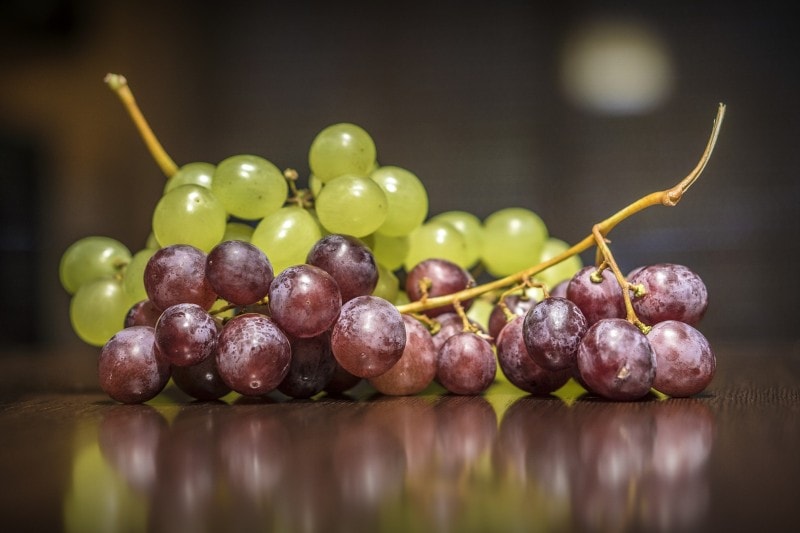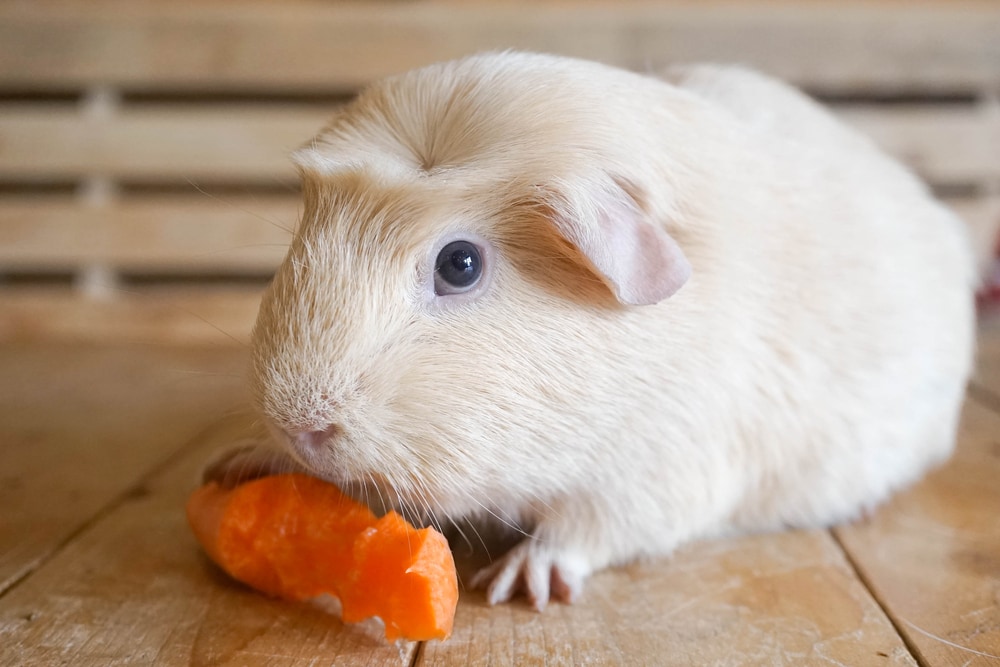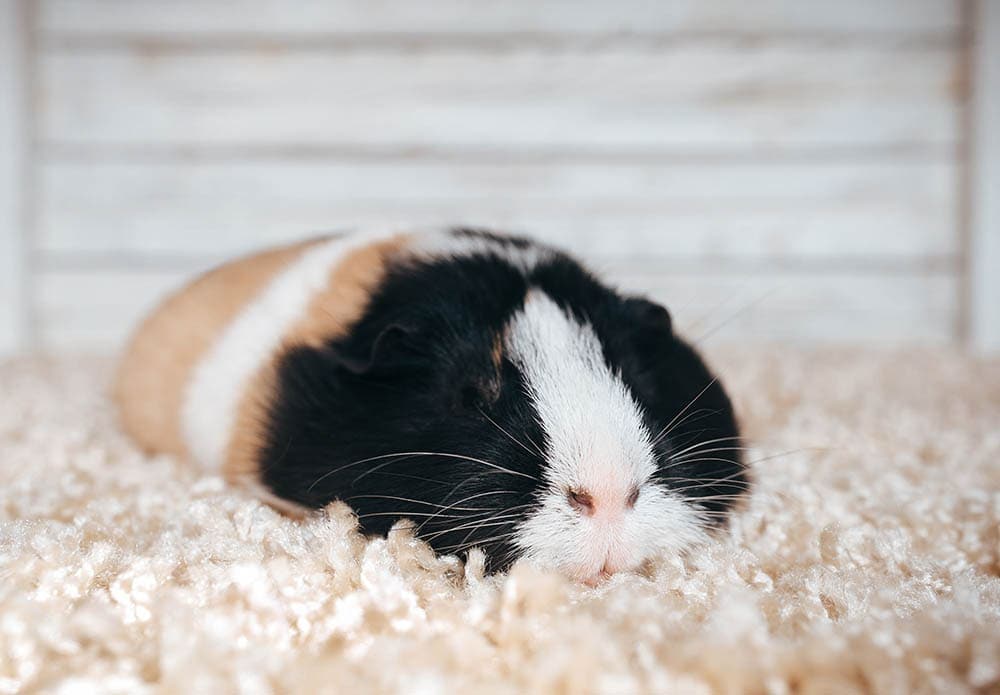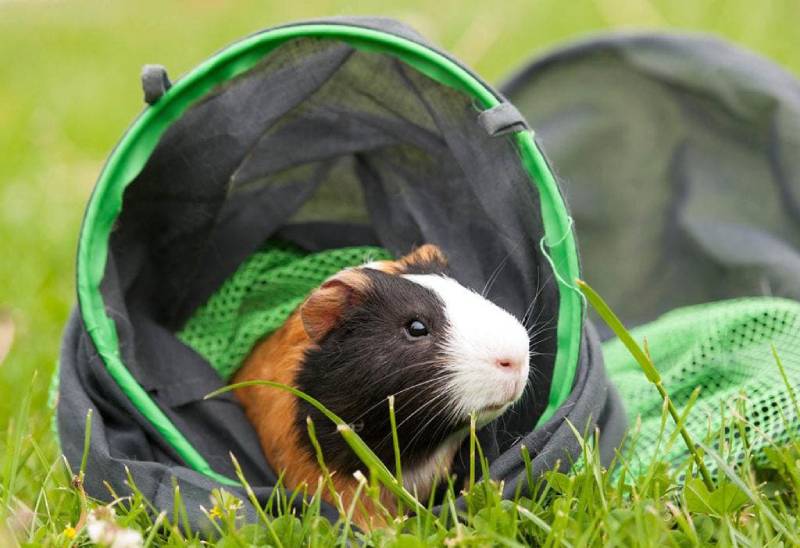Can Guinea Pigs Eat Grapes? Vet-Approved Facts & FAQ
By Beth Crane
Updated on

Guinea pigs are common pets and are often the first pets of many households with children. However, knowing what they can and can’t eat is sometimes difficult to determine. For example, grapes seem like the perfect pocket food for them, but they’re toxic to other pets like cats and dogs. So, can guinea pigs eat grapes? The answer is yes; Guinea Pigs can eat grapes, including red, white, and purple grapes of all varieties! Read on to discover how to add grapes to your guinea pig’s diet and other food they can enjoy.
Can Guinea Pigs Eat Grapes?
Guinea pigs can eat grapes without suffering the same toxic effects as cats and dogs, and they will love them! Grapes can also boost your guinea pig’s energy and provide key nutrients, but they shouldn’t eat them too often.
What Kinds of Grapes Can Guinea Pigs Eat?
Guinea pigs can eat all kinds of grapes, including white, red, and purple grapes. Each grape has different levels of nutrients, such as sugars, vitamins, and antioxidants. Because grapes contain naturally occurring sugars, your guinea pig would probably happily eat grapes all day. However, while grapes can benefit guinea pigs in small amounts, giving them too many can present some problems.

Are Grapes Healthy for Guinea Pigs?
Grapes are a healthy treat in moderation for guinea pigs. Each type of grape (white, red, and purple) has slightly different amounts of vitamins and minerals, but all of them can provide a sweet treat. The nutritional analysis one one grape variant is as follows:
- Water: 80.5 grams (g)
- Energy: 69 Calories
- Carbohydrates: 1 g
- Protein: 72 g
- Fat: 16 g
- Vitamin C: 2 milligrams (mg)
Grapes do have trace amounts of other micronutrients (including some minerals and other vitamins) which, while definitely beneficial for your guinea pig, are in too small quantities to warrant feeding your guinea pig grapes to acquire those nutrients.
Interestingly, though grapes do offer some vitamin C, it’s worth noting that there are other fruits that offer far more vitamin C for your guinea pig. Examples of such fruits include:
- Kiwi: 74.7 mg
- Strawberries: 58.8 mg
- Pineapple: 47.8 mg
- Cantaloupe: 36.7 mg
The comparison above reveals that grapes really don’t fare well in the vitamin C department, either. It’s also worth noting that the comparisons above are for a 100 gram serving of the fruits; your guinea pig wouldn’t eat that much (or rather, they shouldn’t be fed that much fruit).
Therefore, the amount of vitamin C in a grape or two (which is what you’d offer your guinea pig) would be extremely minimal. Conversely, a small serving of the other fruits above would yield more vitamin C.
Nonetheless, it doesn’t mean you shouldn’t feed your guinea pig grapes. In fact, mixing it with some other fruits, or rotating several safe to eat fruits in their treat selection is probably the best way to go about incorporating fruits into your pet’s diet.
Nutritional Downsides of Grapes
While grapes are safe for guinea pigs to consume, they aren’t recommended for them on a daily basis or in high amounts. There are several reasons for this.
- Most fruits are high in naturally occurring sugars, which can lead to an insulin spike for your guinea pig if they consume too many at once.
- Most fruits are primarily composed of water and will cause your guinea pig to fill up on “empty” calories because they don’t offer enough of the other nutrients that they need. They also usually fail to meet the fiber requirements of guinea pigs.
- Fruits can be easily swallowed because they are soft and mushy. However, guinea pigs, like many rodents, require foods to constantly chew on because their teeth continuously grow throughout their lives. Their gut also functions better when they’re fed dry, fibrous foods (such as hay).
- The acidic profile of most fruits means overconsumption of them can lead to sore lips in guinea pigs.
- When left out, fruits quickly spoil and can form a sludge-like mess in your guinea pig’s enclosure. If not cleaned promptly, this creates an environment where harmful bacteria can quickly multiply, which can be problematic for your guinea pig.
How Many Grapes Can My Guinea Pig Eat?
Grapes can be safely given to your guinea pig as a treat. A small piece of grape, about an inch in size or diameter, offered once or twice a week (at most) is usually safe for guinea pigs. When used as a treat, fruits are fantastic for guinea pigs. They spruce up their palate, and offer trace amounts of necessary vitamins, minerals, and other nutritional benefits

What Other Fruits Can Guinea Pigs Eat?
Guinea pigs can eat a wide range of fruits as a treat, but they shouldn’t be served fruits in excess.
Fruits such as cantaloupe, kiwi, strawberries, and apples (with the seeds removed) can all be tasty treats on occasion.
However, veggies are the way to go if you want to provide more treats for your guinea pig. Some are excellent for guinea pigs to eat daily, and some are better fed occasionally. Some vegetables to feed your guinea pigs include:
- Lettuce
- Carrots
- Cilantro
- Kale
- Parsley
- Dill
- Zucchini
- Dandelion
Remember that grapes should only make up a small part of your guinea pigs diet; guinea pigs need lots of hay (such as timothy hay) as the main part of their diet, along with leafy greens and a small portion of pellets.

 Final Thoughts
Final Thoughts
Guinea pigs can safely eat grapes occasionally, but they should not be part of their daily meals. Grapes contain some beneficial vitamins and minerals, which are essential to guinea pigs, such as vitamin C. Guinea pigs can safely enjoy all types of grapes, including white, red, and purple. However, fruits should be considered a treat and not a daily dietary inclusion.
Featured Image Credit: Pexels, Pixabay











